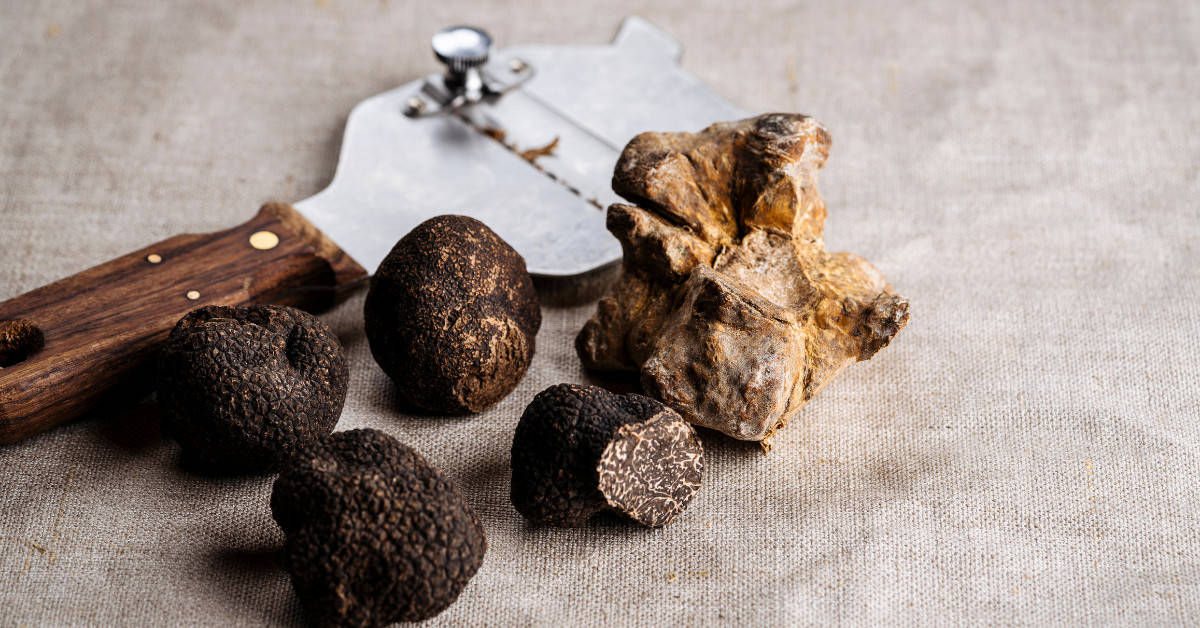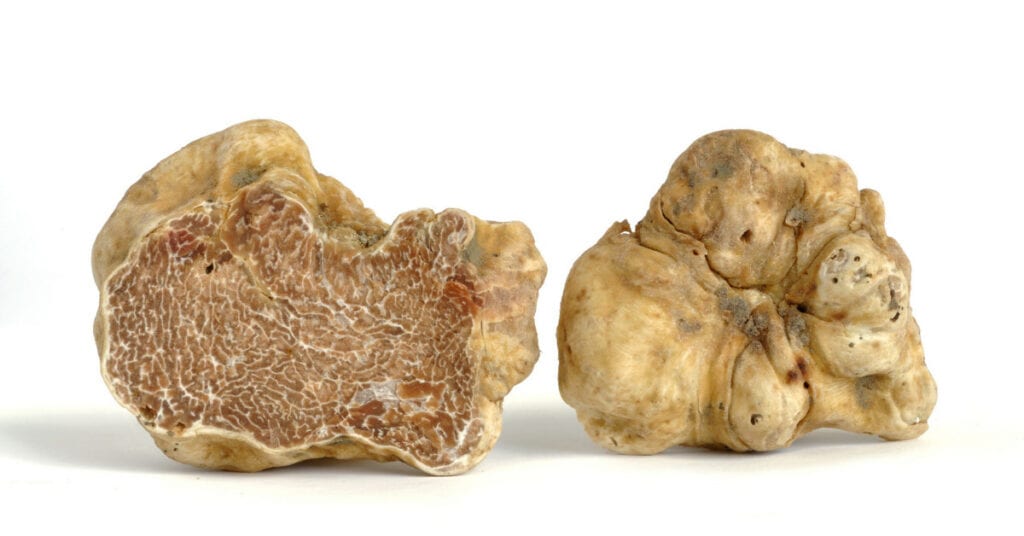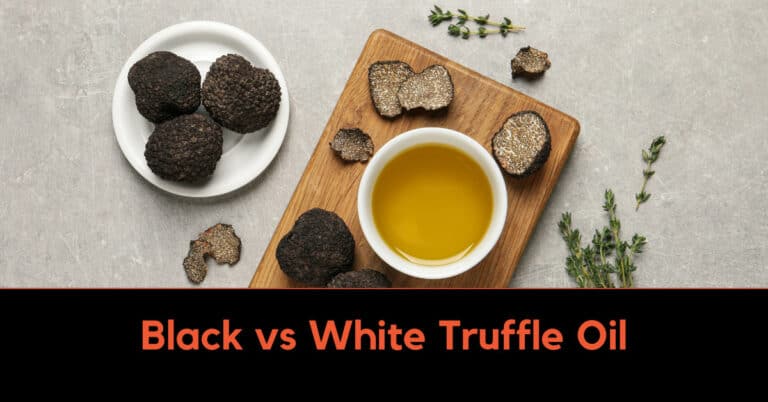SUMMARY: Black truffle oil has a more potent and earthier flavor than white truffle oil, which has a milder and more delicate taste. Both enhance dishes, but black truffle oil is more versatile. It can be paired with a broader variety of ingredients.
Are you struggling to decide between black vs white truffle oil? Which will satisfy your taste and elevate your culinary creations? Look no further! This article will dive deep into the delicious world of truffle oils and explore the nuanced differences between black and white truffle oil. Get ready to tantalize your senses and discover which truffle oil is perfect for your palate.
In this article, we will cover:
- What are truffle oils?
- Black truffle oil: The bold and earthy flavor
- White truffle oil: The delicate and subtle essence
- Choosing between black and white truffle oil
- FAQs about truffle oils
So, let’s embark on this aromatic journey and unravel the secrets of black vs white truffle oil.
What Are Truffle Oils?
Truffle oils are luxurious, aromatic oils infused with the essence of truffles. They are a popular ingredient in gourmet cooking and can elevate a dish’s flavors to new heights. But what exactly are truffle oils, and how are they made? Let’s delve into the world of truffle oils and uncover their secrets.
- Truffle oils are created by infusing a base oil, such as olive or grapeseed oil, with the flavor compounds found in truffles.
- The base oil carries the truffle aroma, capturing the distinct earthy and musky notes.
- Truffle oils can be made using either real truffles or synthetic truffle flavorings. Authentic truffle oils are made using real truffles, while synthetic ones are artificially flavored.
- Authentic truffle oils are typically more expensive due to the cost of real truffles and the labor-intensive process required to capture their flavors.
- Truffle oils can be made using various truffle species, such as black truffles (Tuber melanosporum) or white truffles (Tuber magnatum).
- The flavor profile of truffle oils can vary depending on the type of truffle used and the quality of the oil infusion.
The Origins of Truffle Oils
Truffle oils have a rich history that dates back centuries. Here are some key points about their origins:
- Truffle oils first gained popularity in the late 20th century to bring the elusive flavors of truffles to a wider audience.
- Truffles have a long-standing culinary tradition and have been highly regarded as a delicacy since ancient times.
- Truffle hunting is an age-old practice, often involving specially trained dogs or pigs to sniff out these prized fungi hidden beneath the ground.
- The discovery of truffle oils provided a convenient and more affordable alternative to using fresh truffles in cooking.
Now that we have a basic understanding of truffle oils let’s explore the distinctive qualities of black and white truffle oil in the following sections.

Black Truffle Oil: The Bold and Earthy Flavor
When it comes to truffle oils, black truffle oil stands out with its bold and earthy flavor. Here are some key points to understand the characteristics of black truffle oil:
- Intense and Earthy Flavor Profile: Black truffle oil is known for its intense and distinctive flavor that can elevate any dish. It has a robust, earthy taste that is often described as nutty, musky, or even chocolaty.
- Rich Aroma: The aroma of black truffle oil is deep and pungent, characterized by a combination of earthiness and woodiness. It can fill the kitchen with its enticing scent, creating an irresistible allure.
- Versatility in Pairings: Black truffle oil pairs exceptionally well with various ingredients and dishes. It can enhance the flavors of pasta, risotto, eggs, potatoes, mushrooms, and even meats like beef or lamb.
- Enhancing Umami Flavors: The boldness of black truffle oil adds depth and complexity to dishes, creating a fulfilling umami experience. It can amplify the existing umami flavors in ingredients, making them more pronounced.
- Drizzling and Finishing: Black truffle oil is best used as a finishing touch rather than for cooking. Its delicate flavors and aroma can be easily lost during the cooking process, so it is recommended to drizzle it over prepared dishes just before serving to fully appreciate its unique qualities.
By understanding black truffle oil’s bold and earthy flavor profile, you can experiment with various ingredients and create culinary masterpieces that truly showcase its remarkable taste.
White Truffle Oil: The Delicate and Subtle Essence
White truffle oil offers a delicate and subtle flavor that differs from its black truffle counterpart. Here are some key points to understand the characteristics of white truffle oil:

Delicate and Subtle Flavor Notes:
- White truffle oil boasts a more delicate and nuanced flavor than black truffle oil. It tends to have a milder and less assertive taste.
- Lightly Earthy and Garlicky Tones: The flavor profile of white truffle oil often features delicate earthy notes combined with a hint of garlic. This combination creates a unique and refined taste.
- Complex and Fruity Aroma: White truffle oil is known for its complex aroma, which can be slightly fruity and reminiscent of garlic. The more delicate aroma allows for a more subtle and elegant experience.
- Enhancing Mild Ingredients: Due to its mild nature, white truffle oil works particularly well with ingredients that have more delicate flavors. It can elevate the taste of ingredients like pasta, eggs, risotto, cheese, and seafood without overpowering them.
- Gentle on the Palate: The subtlety of white truffle oil makes it a popular choice for those who prefer a more understated truffle experience. Its delicate flavor delicately intertwines with other ingredients, resulting in a harmonious combination rather than a dominant truffle presence.
Using white truffle oil adds a delicate touch to your dishes, enhancing their natural flavors without overpowering them. The subtle essence of white truffle oil offers a refined and elegant experience that pairs perfectly with lighter ingredients.
Black vs White Truffle Oil: The Verdict
Several factors come into play when choosing between black and white truffle oil. Consider the following points to make an informed decision:
Factors to Consider:
- Personal Taste Preferences: Both black and white truffle oils offer distinct flavors, so it ultimately depends on your taste preferences. Black truffle oil may be the better choice if you prefer a bold and intense flavor. On the other hand, if you choose a more delicate and subtle essence, white truffle oil might be more appealing.
- Culinary Requirements: Consider the specific dish or recipe you plan to use the truffle oil. Assess whether a bolder or milder truffle flavor would complement the other ingredients and the overall flavor profile of the dish.
- Cost: Black truffles are generally more abundant and easier to cultivate, making black truffle oil more readily available and often more affordable. White truffle oil, on the other hand, tends to be more expensive due to the rarity and higher cost of white truffles.
- Experimentation: Why choose only one when you can try both? Consider experimenting with black and white truffle oils to explore the different flavors and find what suits your palate the best. Each oil may uniquely enhance various dishes, providing a wider range of culinary possibilities.
Remember that taste is subjective, and the choice between black and white truffle oil ultimately depends on your personal preference and the specific requirements of your dish. Feel free to indulge in both flavors and explore the world of truffle oils to uncover your culinary delights.
Key Takeaways
In conclusion, the comparison between black and white truffle oil offers a fascinating exploration into the world of truffle-infused flavors. Through this article, we have learned:
- Black truffle oil encompasses a bold and earthy flavor profile, making it ideal for dishes that require a robust and intense truffle presence.
- White truffle oil, on the other hand, offers a delicate and subtle essence that complements a variety of dishes without overpowering them.
- Personal preferences and culinary requirements play a significant role when choosing between black and white truffle oil. Experimenting with both types is encouraged to uncover your preferred taste.
- Truffle oils use real truffles, typically infused with olive oil or synthetic compounds to enhance the aroma and flavor.
- Truffle oil can be used in cooking and baking, elevating various dishes from pastas to salads and even desserts.
- Proper storage is crucial to maintain truffle oil’s freshness. Keeping it refrigerated and consumed within a few months after opening is recommended.
- While alternative products are available, such as truffle-infused salt or butter, truffle oil remains a convenient and versatile option for adding truffle flavors to dishes.
- Authentic truffle oil can be purchased from reputable online retailers, gourmet food stores, or specialty truffle producers.
- Although truffle oil can hint at truffle flavor, it cannot replace fresh truffles’ complex and nuanced taste.
- Some popular truffle oil brands known for their quality and authenticity include Urbani, Sabatino Tartufi, and La Tourangelle.
We hope this article has provided valuable insights into the nuances of black and white truffle oil, allowing you to explore and appreciate the unique flavors that each type offers. Embrace the opportunity to experiment and discover your preferred truffle oil companion in your culinary endeavors.
FAQ
Are truffle oils made from actual truffles?
Yes, truffle oils are made using real truffles, the primary source of their distinctive aroma and flavor. However, it is essential to note that the intensity and quality of truffle oil can vary depending on the production process and the type of truffles used.
Can truffle oil be used in cooking and baking?
Absolutely! Truffle oil can enhance many dishes, including pasta, risotto, salads, roasted vegetables, and desserts. Its versatile nature allows for creative applications in cooking and baking, adding a touch of truffle-infused flavor to elevate your culinary creations.
How long does truffle oil stay fresh after opening?
To maintain the freshness and aroma of truffle oil, consuming it within a few months after opening is recommended. As with all food products, proper storage is essential. Keeping the truffle oil refrigerated and tightly sealed will help extend its shelf life.
What is the shelf life of truffle oil?
Unopened truffle oil can have a shelf life of up to 2 years if stored in a cool and dark place. However, once opened, its shelf life is typically reduced to a few months. As mentioned earlier, refrigerating the truffle oil and consuming it within a reasonable timeframe after opening will help preserve its quality.
Are there any alternatives to truffle oil?
While truffle oil remains popular for adding truffle flavor, alternatives are available. Truffle-infused salt, butter, or freshly shaved truffles can provide similar aromatic experiences. However, it is important to note that these alternatives may offer a different intensity or convenience than truffle oil.
Where can I buy authentic truffle oil?
Authentic truffle oil can be purchased from reputable online retailers, gourmet food stores, or specialty truffle producers. It is recommended to seek out trusted sources to ensure the quality and authenticity of the truffle oil you purchase.
Can truffle oil be substituted with fresh truffles?
While truffle oil can offer a hint of truffle flavor, it cannot fully replicate the complexity and nuance of fresh truffles. If your recipe calls explicitly for fresh truffles, substituting with truffle oil may yield different results. Fresh truffles are best enjoyed shaved or sliced thinly, allowing the full intensity of their flavor to shine through.
What are some popular truffle oil brands?
Several reputable brands are known for producing high-quality truffle oils. Some popular options include Urbani, Sabatino Tartufi, and La Tourangelle. These brands are recognized for their commitment to using authentic truffle ingredients and ensuring the highest quality standards in their truffle oils.





